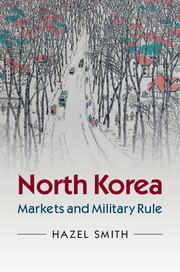Book contents
- Frontmatter
- Dedication
- Contents
- Acknowledgements
- Introduction: North Korea: politics, economy and society
- Part I Jettisoning caricatures: understanding history
- Part II The rise and fall of Kim Il Sungism
- 3 Colonial occupation and the rise of Kim Il Sung
- 4 War-fighting as state-building
- 5 ‘Socialism in our own style'
- 6 Sisyphus as economic model
- 7 Social stratification in the workers' state
- 8 Famine and the end of Kim Il Sungism
- Part III Marketisation and military rule
- Bibliography
- Index
7 - Social stratification in the workers' state
from Part II - The rise and fall of Kim Il Sungism
Published online by Cambridge University Press: 05 May 2015
- Frontmatter
- Dedication
- Contents
- Acknowledgements
- Introduction: North Korea: politics, economy and society
- Part I Jettisoning caricatures: understanding history
- Part II The rise and fall of Kim Il Sungism
- 3 Colonial occupation and the rise of Kim Il Sung
- 4 War-fighting as state-building
- 5 ‘Socialism in our own style'
- 6 Sisyphus as economic model
- 7 Social stratification in the workers' state
- 8 Famine and the end of Kim Il Sungism
- Part III Marketisation and military rule
- Bibliography
- Index
Summary
Kim Il Sung's North Korea is conventionally understood as if there were few social cleavages other than those founded around political fault lines. Kim Il Sung attempted to create a monolithic society in which social differentiation was always a function of the political system, but to think of Kim Il Sung as having been uniquely successful in achieving the absolute subordination of the society to the state is misleading. Kim Il Sungist society was also shaped by multiple identity markers including occupation, geographical provenance, gender and generation.
Kim Il Sung set out to create a society where loyalty to the Leader provided the most important qualification for social status and privilege. Occupational status also followed political allegiance as the best jobs were reserved for Party members and officials. To the extent that Kim Il Sungist politics created a new social structure it was through reinforcing the power and privilege of Party members over and above the broader society. North Korean society was not, however, a historical and social tabula rasa. Regional differences, especially between the north-eastern Hamgyong provinces and the south-western Pyongyan provinces, remained salient even as they were attenuated by proactive regional redistributive policies.
Despite the social dislocation caused by colonial policies and the Korean War, Kim Il Sungist North Korea retained and embedded some very long-standing social conceptions, including a view of women as natural home-makers. Kim Il Sungist policy was to valorise women as mothers although not all of Kim Il Sungist social policy resonated with conservative, historically constituted social norms. Kim Il Sung was resolutely anti-Confucian in that he consciously implemented policies that sought to overturn social relations that had prioritised age and experience over youth. The mix of modernity and tradition in Kim Il Sungist social policy was demonstrated in the recognition of the family as the core unit of the national society but in Kim Il Sungist society the family was important as a micro-unit of Kim Il Sungist politics whose main function was to educate future generations of revolutionary cadres.
- Type
- Chapter
- Information
- North KoreaMarkets and Military Rule, pp. 164 - 185Publisher: Cambridge University PressPrint publication year: 2015



